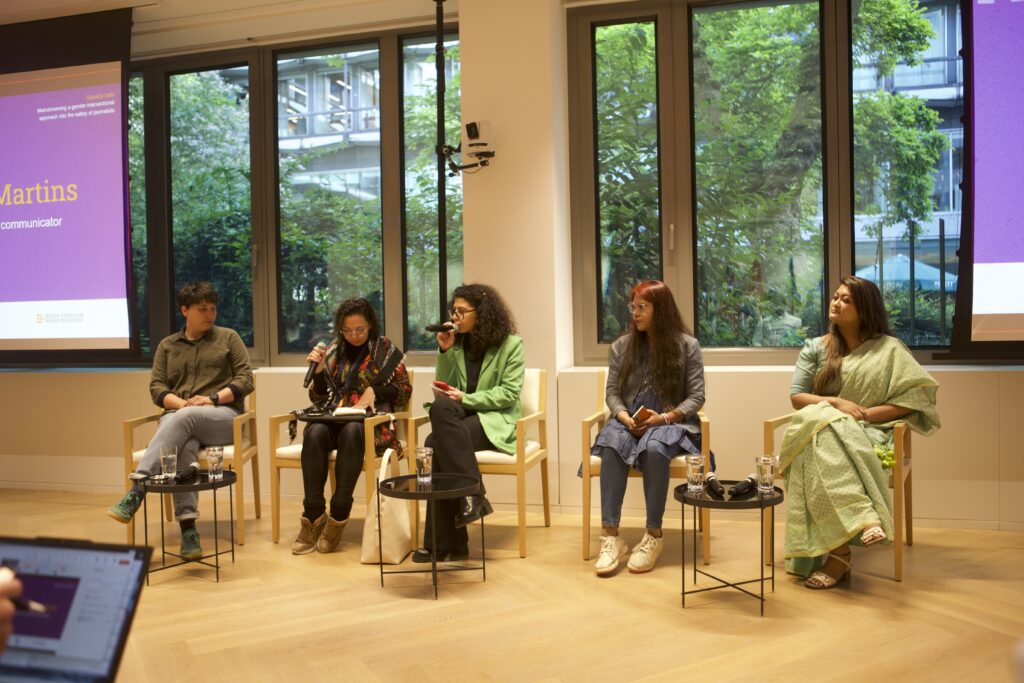
By Aagje Van Raemdonck and Jan Rehaag
In a panel discussion on May 5, female journalists from across the world came together in the Embassy of Canada to Belgium to discuss the abuse, discrimination, and violence faced by female journalists. The event was organised by the British human rights organisation Article 19 and cohosted by AEJ Belgium.
While press freedom today is under attack on a global scale, women journalists are disproportionately impacted compared to their male counterparts and are exposed to harassment, intimidation and even death threats in their daily lives.
Several female journalists from all around the globe travelled to the event to tell their stories of harassment, abuse, blackmail and other hardships they have endured. Among them were journalists Gizele Martins, Ana Brakus, and Milica Vojinovic.
Spotlight on Brazil
Photo: Aagje Van Raemdonck – Gizele Martins (middle) explaining the treatment of female journalists in Brazil
In Rio de Janeiro lies Favela da Maré – the home of journalist and activist Gizele Martins. A favela is a type of irregular and impoverished neighbourhood in Brazil’s big cities, notorious for high crime rates and poor living conditions.
As a journalist in Brazil, Gizele has faced harassment and abuse for much of her professional life.
But about ten years ago, the troubles reached new heights.
Gizele was forced to leave her home after the Brazilian army took over the favela. When she reported on the police violence that happened during the occupation of her hometown, the army started an online harassment campaign, accusing her of lying about her experience.
Gizele lost her house, her friends and her job, but never received any form of compensation from the state, she says. Today, she advocates to raise awareness of the reality of life in the favelas.
“It’s important to highlight that in the favelas, the way that the state promotes violence against everyone is also aimed at journalists and people who denounce the violence,” Gizele explained. “And that has an important gender component, because some of the threats that I face, mainly through the police actors, were also involving rape, menaces, and other kind of harassment,” Gizele noted.
She also highlighted that violence in the favelas is not dependent on the political ideology of the government in power, but happens “constantly.”
Because of these ongoing problems, Gizele thinks that Brazil cannot be called a true democratic country in its current state.
“There are no specific laws to protect journalists in Brazil, and not even specific political policies to address violence against journalists. We also don’t have equality in communication and journalism. And because of that, it’s difficult to even call our country democratic, even though, on the political side, we have democratic procedures,” she argued.
Photo: Pat_Photographies via Pixabay – A favela in Rio de Janeiro, Brazil.
But there is also resistance against the abuse. Gizele highlighted the crucial role of human rights organisations, which, in addition to localised support networks within the favelas, provided support to local residents.
“In moments where the attacks [by the police] are rising, we organise mainly through Signal or WhatsApp groups to be able to organise security strategies. So things like groups with lawyers to say when they are going to a police station, when they are being harassed by the police, or groups with social movements, when it’s necessary to have a support statement,” she said.
The support groups also offer protection against violence towards Gizele’s family if she has to leave the favela due to police raids, which makes them all the more important to her. Martins sees self-organisation as key to fighting the violence, but stresses that further measures are needed on a state level to fight discrimination against women journalists, but also against the LGBTQ+ community and indigenous people in Brazil. In addition, professional mental help is required, she added.
“It’s important to think about psychological help because women journalists are getting sick in all countries, mentally sick, because they don’t have state support, because the support given by the civil society is not sufficient to guarantee psychological support and other kinds of support,” Gizele emphasised.
But harassment and violence are not issues exclusive to Brazil. In Croatia and Serbia, threats can be just as severe.
Spotlight on Croatia
Photo: Aagje Van Raemdonck – Ana Brakus (left) discussing the challenges she and her team at Faktograf have to face.
Ana Brakus is the CEO of Faktograf, a Croatian fact-checking medium based in Zagreb. She and her team were also targeted by several harassment campaigns.
“We have been receiving death threats on a daily basis,” Ana said. She recalled that the threats were at their worst during the COVID-19 pandemic. In total, her organisation reported over 50 noteworthy cases of death threats to the police.”
The rate of femicide in Croatia over the last six years is substantial, with over 60 known cases reported by FemPlatz.
Blackmailing through emails is another huge issue for Faktograf, said Ana, especially for the female employees.
“Female colleagues have their pictures posted everywhere and are being called whores and prostitutes. You’re either too thin, too fat, too beautiful, too ugly, too whatever,” she added. The female employees were also called the “harem” of Faktograf’s editor-in-chief, who is a male.
The media outlet was even ridiculed through a song that was then nominated for a prestigious award in Croatia, which Ana sees as a sad reflection of Croatian society’s attitude towards harassment.
To combat the physical harassment, Ana opted to rent two offices for Faktograph.
“One is where we work. The other one is where we receive our post, and it’s something that’s officially there, because I don’t want to endanger the 20 people that I work with,” she said.
The main office is regularly subjected to protests and other threats, which makes it generally unsafe for employees to be around, she explained.
Croatia has policies to combat harassment, as it is prohibited by EU law. Yet, Ana feels like the country doesn’t do enough to implement them.
“Croatia has certain policies, because Croatia is in the EU and it really likes to tick boxes. But it doesn’t really care how well you implement them,” she said.
To Ana, regulations without the consciousness surrounding them don’t seem to make much sense. She thinks protecting female journalists starts with protecting women.
Brakus described the gender discrimination Faktograph is facing as “very draining”, both mentally and financially. She complained that funds need to be wasted to fight gender discrimination instead of being available for “actual good work.”
Besides the harassment, death threats and abuse, Ana and her team often have to deal with Strategic Lawsuits Against Public Participation (SLAPPs), which are lawsuits filed to intimidate and silence critics.
Milica, a Serbian investigative journalist who works for KRIK in Belgrade, sees many similarities between Croatia and Serbia. SLAPPs are one of the main problems for her and her team.
“We, I think, have the most SLAPPs in Serbia. We are now dealing with 17 active lawsuits. Some of them we won, some of them we lost. And that is actually one of the biggest problems we are facing right now because we are living in a country with no independent judiciary,” she said.
Milica sees that the people suing her and her team are boycotting them by asking for prison sentences, criminal charges and financial charges. She also notices that judges may become more likely to convict them.
She believes that international exposure is a way to change the outcomes of these SLAPP cases.
“What we have seen as one of the main things that worked to stop them, at least for a little while, was the public exposure. That is something that our government has feared before and has been backing away when we have support internationally and when we showed what was going on,” Milica said.
The experiences shared by Gizele, Ana, and Milica illustrate how female journalists are subject to discrimination, gender violence, and inequality worldwide. They highlight the need for a feminist, intersectional gender approach in journalism, aiming to make the world a safer place for women journalists.
Photo: Aagje Van Raemdonck – The facade of the Canadian Embassy in Brussels
The event was organised as part of a project called Equally Safe: Towards a feminist approach to the safety of journalists. This project, set up by Article 19, aims “to help civil society, journalists, researchers and policy makers to apply an intersectional feminist approach to their work.”
Photo: Aagje Van Raemdonck – The Canadian, European and Belgian flags inside the Canadian Embassy in Brussels
It was hosted in the Canadian Embassy to Belgium in Brussels by Global Affairs Canada and co-hosted by AEJ Belgium. Canada was a founding member of the Media Freedom Coalition, which is now home to 51 countries.
